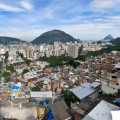Rio+20: Form Guide 101
Anna Rose | June 21, 2012.
Why is it called Rio+20?
Twenty years ago, an historic international gathering was held in Rio De Janeiro, Brazil. Heads of State, government delegations and civil society organisations ascended on the RioCentro convention centre to forge a global framework designed to promote sustainable development: poverty eradication while protecting and restoring nature. The summit was responsible for creating most of the foundation stones of international environmental law.
What’s at Stake?
Environmental crises have worsened in the two decades since the original Earth Summit. At a side event in Riocentro today, some of the world’s best scientists held a public workshop warning that the Earth is hitting ‘planetary boundaries’ (load-bearing limits on human activity related not just to climate change, but also biodiversity, chemicals dispersion, ocean acidification, freshwater consumption and other thresholds). According to the scientists, we are in danger of passing many of these limits.
In short: if we don’t figure out a way to truly shift the current model of economic growth and development that pits the planet against the economy, both the planet and the economy are going to crash and burn.
What Will Happen in Rio?
Over 130 Heads of State are gathering in Rio to set new, non-binding goals for sustainable development and make commitments about how these goals will be funded. In the words of the United Nations General Assembly, “the conference aims to secure renewed political commitment for sustainable development, assess progress and gaps in implementation of outcomes of previous summits, and to address new and emerging challenges.”
Prepatory negotiations for the Summit have been underway since 2010. However, progress has been slow and most countries are unwilling to make concessions that will limit their short-term economic interests. There is a lack of trust given the failure of previous commitments and the lack of leadership from influential countries like the United States.
When Brazil released a new draft negotiating text over the weekend, Greenpeace International’s political director Daniel Mittler said it “would condemn the world to a future of pollution, plunder and destruction. There is no action here, no commitment.”
Who are the Aussies Here?
Australia’s Chief Negotiator is Donna Petrochenko, leading a small team of negotiators across various issue areas including oceans, the institutional framework for sustainable development, biodiversity and mining.
Prime Minister Gillard will arrive tomorrow to host Australia’s only official ‘side event’, the launch of an Indigenous Rangers program. Environment Minister Tony Burke was supposed to be attending. He cancelled his trip, however, because the Opposition refused him a pair that would have allowed him to arrive in time for the side event and bilateral meetings.
Senator Larissa Waters from the Australian Greens is also attending, along with an assortment of representatives of Australian civil society including the National Farmer’s Federation, Australian Conservation Foundation, Oxfam Australia and the Girl Guides. A reasonable number of Australian University students can also be spotted in the corridors.
What Are the Key Issues?
Negotiators are still trying to nut out a final text for Heads of State to work with during the last two days of talks on Thursday and Friday. Currently countries are working off a document prepared by the Brazillian government and based on original ‘draft negotiation text.’ Brazil is inisisting that countries cannot edit the text directly and is working in informal groups to deal with ongoing issues raised by various governments.
For developing countries, a ‘must’ in Rio is reaffirming the original Rio Earth Summit principles, especially the the concept of “common but differentiated responsibilities (CBDR). “CBDR brings equity into the centre of the obligations to save the world,” said the Executive Director of the South Centre Martin Khor. As such, providing technology transfer and finance to developing countries to help them develop sustainably is a key issue.
Meanwhile, campaigners attending the summit are pressuring nations to fulfil the commitment previously made by the G20 to phase out the nearly $1 trillion in handouts and tax-breaks to the fossil fuel industry globally. “Ending fossil fuel subsidies has emerged as the loudest and clearest demand from civil society during this summit,” said Jamie Henn from the international climate campaign 350.org.
Anti-poverty campaigners have also been running a high-profile campaign inside the conference centre calling for countries to enforce corporate tax commitments. Christian Aid argues that getting multinational companies to pay the taxes they owe would generate billions in funding for sustainable development, estimating that developing countries alone lose $160 billion a year to the problem – far more than they receive in aid.
Who are the Good Guys Here?
Sadly, none. The EU has at least committed to the concept and process of having an internationally agreed approach to solving environmental problems, but is more focused on protecting its own markets from the emerging economies than committing real resources to fighting poverty in a sustainable way.
The G77 (the confusingly-named group of over 130 developing countries including China, India and Brazil) are taking a principled stand to preserve the principles of the original Rio agreement as a framework for the way forward, but are blocking many new environmental commitments until they secure new resources from the developed nations.
Who’s Really Blocking Progress?
It’s hard to swallow for most “hopey-changey” fans of President Obama but it appears his negotiators have the ‘shoot to kill’ order on any reaffirmation of the original Rio principles. Ironically, those principles were originally negotiated by the Bush and Thatcher governments.
The US has its ‘deputy-sherrifs’ on hand too, led most ably by Canada whose government has recently become infamous for breaking a number of environmental pledges made by the previous government, starting with a pledge to break their Kyoto Protocol commitments.
What’s Australia Up to So Far?
Australia is trying to be a bridge-builder on a range of issues, perhaps in a bid to escape notice as it keeps striving for its security council bid. According to the delegation, priorities are ocean protection, Indigenous rights and the right to food. There has also been some controversial talk of ‘sustainable mining’.
Written by Anna Rose, author of the book ‘Madlands: A Journey to Change the Mind of a Climate Sceptic‘. This first appeared in Crikey.com.au and photo by C. Schubert via Climate Change, Agriculture and Food Security.











comment